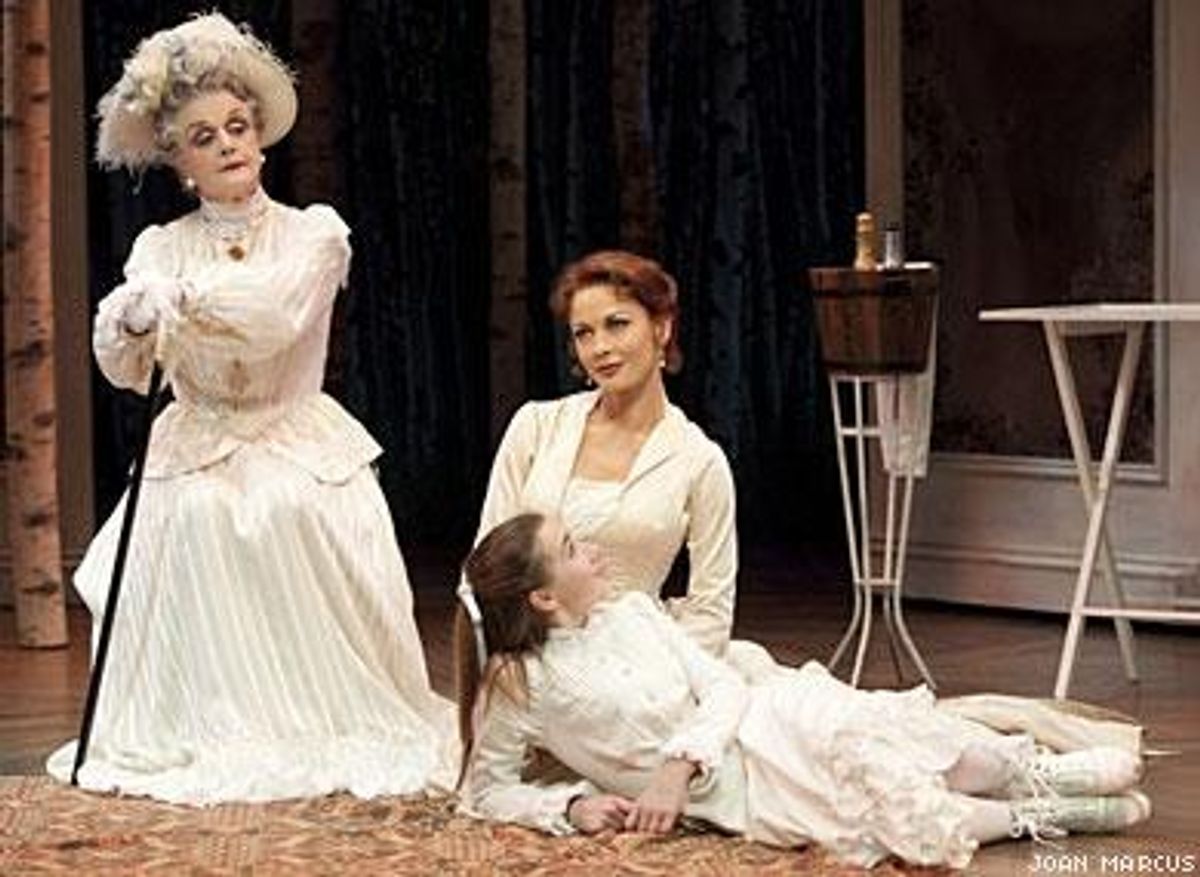As flaming as it sounds, sometimes I feel so lucky to be living in New York at a time when so many of Stephen Sondheim's classic musicals are getting starry revivals on Broadway. Like one of those sad teens in Camp, I can still remember wearing out my Sondheim CDs as an overweight kid with limited talents -- OK, there might've been some cassette tapes involved -- as I fantasized about one day playing Jack in Into the Woods and dreamed of dining at Sardi's with Steve, any show queen's ultimate sugar daddy. My acting aspirations may've been follies, but my passion for Sondheim has never been assassinated. (See what I did there?)
A revival of A Little Night Music, Sondheim's sentimental 1973 musical set in early-20th-century Sweden, was one of only six shows worthy of Seat Filler attention during an otherwise desolate post-holiday period. Though not as revolutionary as recent revivals of Company or Sweeney Todd, Trevor Nunn's shadowy, spartan staging at the Walter Kerr Theatre is haunting. Based on the Ingmar Bergman film Smiles of a Summer Night, the sophisticated tuner celebrates a web of sexual dalliances during a weekend in the country, including a rekindled romance between Desiree, an aging actress, and a middle-aged lawyer married to a cock-teasing 18-year-old virgin. Star Catherine Zeta-Jones looks, sounds, and emotes beautifully as Desiree, especially as tears fill her eyes during "Send in the Clowns." And as her prickly wheelchair-bound mother, 84-year-old legend Angela Lansbury often remembers her lines.
After touring last year with Mommy Queerest, outrageous lesbian comedian Judy Gold returns to Manhattan with her latest one-woman show, Jewdy! Jewdy! Jewdy! Monday nights through January 25 at the Laurie Beechman Theatre. The 25 Questions for a Jewish Mother star is still kvetching about her martyred Jewish mom and the not-always-joys of raising two straight sons with her crazy ex-girlfriend and jealous new girlfriend, but Gold doesn't shy away from serious politics. "I'll talk about gay marriage anywhere I go," she says before singing an original song about the many rights denied gay couples -- which isn't exactly the smoothest way to cap off an evening of comedy. She also uses a slide projector to show off family photos, including a great one of her son at an anti-Proposition 8 rally outside a Mormon church holding up a sign that reads, "My two mommies can beat up your 14 wives!"
According to the program of Sexual Healing, which spices up Theater 3 through January 30, "Any similarity between any characters depicted in this play and any actual persons ... is strictly coincidental." So while watching Dr. Munson and his assistant-turned-wife, Desiree, perform Kinseyian tests in a Cleveland obstetrics clinic from 1959 to 1992, don't think of pioneering sex researchers William H. Masters and Virginia E. Johnson. The fictional clinic in this unfocused drama uses female sexual surrogates to cure impotency in straight couples and -- vaginal entry only! -- homosexuality in males. I prescribe that playwright-director Jonathan Leaf strip some poor storytelling techniques and clumsy attempts at humor, but in light of the lopsided male-to-female nudity and Hugh Sinclair's unaffecting portrayal of two homosexual patients, Sexual Healing might be better cured with a dose of gay sensibility.
Gay if not always sensible, David Greenspan is a lot smarter than me. This has never been more evident than after seeing his solo play The Myopia: An Epic Burlesque of Tragic Proportion, which will leave audiences breathless and boggled until February 7 at the Atlantic Stage 2. An odd fixture of New York's downtown performance scene (and an Obie award winner for Terrence McNally's Some Men and a revival of The Boys in the Band), Greenspan demands we reconsider and reexamine all our preconceived notions about the theater as he upends stage conventions to create -- only in your mind's eye -- a complex theatrical landscape involving Warren G. Harding, a Jewish Rapunzel, and Carol Channing. Last seen in 2003, this armchair-anchored one-man marvel is appropriately preceded by a slightly winky reading of Gertrude Stein's 1934 lecture Plays as a double feature on weekends.
Winner of the Best of Edinburgh Award at Scotland's Edinburgh Fringe Festival, Little Gem ended its little engagement at the little Flea Theatre on January 16 before heading back across the pond to play the Abbey Theatre in Dublin. Elaine Murphy's charmingly colloquial play is a gem indeed, and one that sparkles with surprising wit and substance for a first-time playwright. Taking inspiration from her loquacious Irish predecessors like Conor McPherson and Brian Friel, Murphy milks a magically delicious evening out of intertwined monologues from three thick-accented generations of Irish women: Amber, a sassy teen who mistakes the plus sign on her pregnancy test for a negative x; her mother, Lorraine, a harried shop worker harassed by an ex; and Lorraine's mother, Kay, who tries to scratch an "itch down there" with a noisy vibrator she describes in hilariously graphic detail.
A hit transfer from the Irish Rep, The Emperor Jones rules the Soho Playhouse until January 31. In Eugene O'Neill's 1920 expressionistic drama, African-American ex-con Brutus Jones has somehow positioned himself as a cruel dictator of a remote island in the West Indies. When the natives revolt, Jones, played with whip-cracking yet uncertain bravado by John Douglas Thompson, takes a long nightmare's journey into the forest, where he's driven to madness by hallucinations or haunts that are stunningly conjured with creepy masks, a chorus of tree-people, and old-school puppetry. Though I can't shake the feeling that the play's more than a little bit racist -- dense with minstrel dialect, it practically opens and ends with Jones's white ally spouting the n word -- it's a must for O'Neill fans and perhaps best viewed by all as the relic it is. If you're really intrigued, try tracking down the 1933 film version.

















































































